Humankind: A Hopeful History

Author: Rutger Bregman
Publisher: Bloomsbury Publishing
Year of Publication: 2020
Print Length: 480 pages
Genre: Non-Fiction / Popular Science, History
Topic: Activism, History, History & Origin, Hope, Advocacy, Altruism, Civil Participation, Collaboration & Participation, Community, Community Development, Compassion, Compassion Fatigue, Apathy, Empathy, Ethics & Morality, Compromise, Conflict & Post-Conflict, Conviviality, Courage, Crimes, Culture & Society, Friendship & Companionship, Generosity, Good/Best Practice, Psychology, Religion
The “lively” (The New Yorker), “convincing” (Forbes), and “riveting pick-me-up we all need right now” (People) that proves humanity thrives in a crisis and that our innate kindness and cooperation have been the greatest factors in our long-term success as a species.
If there is one belief that has united the left and the right, psychologists and philosophers, ancient thinkers and modern ones, it is the tacit assumption that humans are bad. It’s a notion that drives newspaper headlines and guides the laws that shape our lives. From Machiavelli to Hobbes, Freud to Pinker, the roots of this belief have sunk deep into Western thought. Human beings, we’re taught, are by nature selfish and governed primarily by self-interest.
But what if it isn’t true?
International bestseller Rutger Bregman provides new perspective on the past 200,000 years of human history, setting out to prove that we are hardwired for kindness, geared toward cooperation rather than competition, and more inclined to trust rather than distrust one another. In fact this instinct has a firm evolutionary basis going back to the beginning of Homo sapiens.
From the real-life Lord of the Flies to the solidarity in the aftermath of the Blitz, the hidden flaws in the Stanford prison experiment to the true story of twin brothers on opposite sides who helped Mandela end apartheid, Bregman shows us that believing in human generosity and collaboration isn’t merely optimistic—it’s realistic. Moreover, it has huge implications for how society functions. When we think the worst of people, it brings out the worst in our politics and economics. But if we believe in the reality of humanity’s kindness and altruism, it will form the foundation for achieving true change in society, a case that Bregman makes convincingly with his signature wit, refreshing frankness, and memorable storytelling.
Table of Contents
Prologue
1. A New Realism
2. The Real Lord of the Flies
PART 1: THE STATE OF NATURE
3. The Rise of Homo puppy
4. Colonel Marshall and the Soldiers Who Wouldn’t Shoot
5. The Curse of Civilisation
6. The Mystery of Easter Island
PART 2: AFTER AUSCHWITZ
7. In the Basement of Stanford University
8. Stanley Milgram and the Shock Machine
9. The Death of Catherine Susan Genovese
PART 3: WHY GOOD PEOPLE TURN BAD
10. How Empathy Blinds
11. How Power Corrupts
12. What the Enlightenment Got Wrong
PART 4: A NEW REALISM
13. The Power of Intrinsic Motivation
14. Homo ludens
15. This Is What Democracy Looks Like
PART 5: THE OTHER CHEEK
16. Drinking Tea with Terrorists
17. The Best Remedy for Hate, Injustice and Prejudice
18. When the Soldiers Came Out of the Trenches
Epilogue
Acknowledgements
Notes
Index

Rutger Bregman is a historian and author. He has published four books on history, philosophy, and economics. His History of Progress was awarded the Belgian Liberales prize for best nonfiction book of 2013. The Dutch edition of Utopia for Realists became a national bestseller and sparked a basic income movement that soon made international headlines. Bregman has twice been nominated for the prestigious European Press Prize for his journalism work at The Correspondent. His work has been featured in The Washington Post, The Guardian and on the BBC.
Source: https://www.weforum.org/agenda/authors/rutger-bregman/
More from Rutger Bregman in this library, click here.
